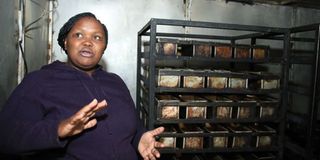Covid-19 dims baker’s delight

What you need to know:
- Ms Sarah Wanjiru runs Shiloh Loaf Bakery in Utawala, Nairobi County, which has been hard hit by Covid-19.
- Business has been running since 2018, employing 38 people. reduced to five, thanks to the pandemic.
- Sudden closure of the learning institutions, her main clients, resulted to abrupt drying of her cash flow tap.
- The huge drop in production meant little returns to even pay the workers and she had to clear their salaries out-out-pocket.
- Then rent became a struggle and for three months she struggled to pay, then her landlord disconnected electricity - the life of her business.
Darkness welcomes you to an open large room with piles of crates.
Some filed before a closed wide main entry door, others on the sides of an aisle leading to huge multi-million machines on the far end of the room.
It is quiet here and only the light from the grilled windows give some life to the room.
In one corner is a large pan with frozen oil. In another, a cold oven. In between, is another seemingly sad oven because no one is sliding out the racks to get bread and put in fresh dough.
This is Shiloh Loaf Bakery in Utawala, Nairobi County.
COVID-19
The ovens would be humming now to produce the 10,000 loaves of bread, daily.
It is a business that Ms Sarah Wanjiru has been running since 2018, employing 38 people.
But then, Covid-19 happened. It hit Kenya in mid-March pushing the government to effect closure of learning institutions across the country to contain spread of the deadly coronavirus disease.
Sudden closure of the learning institutions resulted to abrupt drying of her cash flow tap. Ms Wanjiru’s main clients are schools, colleges and universities in urban and upcountry, most of which closed before clearing money they owed her.
She nevertheless continued with her production, albeit at five per cent, to keep her brand alive. This forced her to reduce the workforce to eight.
OUT OF POCKET
The huge drop in production meant little returns to even pay the workers. She had to clear their salaries out-out-pocket.
Then rent became a struggle and for three months she struggled to pay, then her landlord disconnected electricity - the life of her business.
"I can't do anything now," says Ms Wanjiru who has challenged the owner's decision in court.
She knows it is a dark cloud that will soon clear out and she will get back on her feet.
And for that to happen, she says she requires about Sh800,000.
“I will need the money to normalise my operations - buy enough raw materials and pay all the 38 employees as the business stabilises,” she says.
SMEs
Her hopes are now stuck with the State’s Sh3 billion Credit Guarantee Scheme for the small, micro and medium enterprises(SMEs) which nevertheless President Uhuru Kenyatta said would be granted only through the sieves of professional standards and practices of private sector credit arrangements.
According to Survey on Socio Economic Impact of Covid-19 on Households Report by Kenya National Bureau of Statistics, more women than men lost jobs between March and May as a result of Covid-19 disruptions.
Thant 51.2 per cent women lost employment with many being dropped off from hospitality, retail and manufacturing sectors, which are worst affected.
EXTREME POVERTY
Revival of such businesses as Ms Wanjiru’s would ensure women recover from economic instabilities associated with extreme poverty and malnutrition of children as mothers are unable to feed their children a balanced diet.
Studies show that women-led businesses are also likely to employ women, thus supporting their revival would save women from discrimination in accessing employment opportunities as businesses strive to restart their operations.
A 2017 Graça Machel Trust study questioned 398 female entrepreneurs in Kenya, Rwanda, Tanzania and Uganda on gender composition of their human resource and found that 55 of the female entrepreneurs have more than half of their staff as females.
CREDIT SCHEME
“Therefore, empowering women-owned or -led businesses can drive more diversity in the workforce,” states the Survey to Explore Growth Barriers Faced by Female Entrepreneurs in East Africa.
Cabinet Secretary for Public Service and Gender Prof. Margaret Kobia said in an August 7, interview that the government had entered into an agreement with designate banks including Absa and KCB to award the Sh3 billion Credit Guarantee Scheme credit to women entrepreneurs without much constraints,





